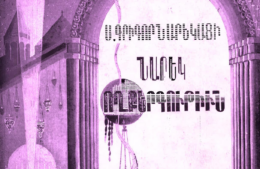Obituary: Writer Yasar Kemal played a key role in stopping the planned destruction of the Akhtamar church
- (0)
Obituary: Writer Yasar Kemal played a key role in stopping the planned destruction of the Akhtamar church –

– In 1951, Yasar Kemal, a reporter of Kurdish origin, witnessed the beginning of the demolition plan of Sourp Khatch church on the island of Akhtamar while visiting the region. He used his contacts to stop the destruction of the site and raised awareness of it through his writings. This is how a masterpiece of world and Armenian medieval architecture was saved. The church, however, was left in a dilapidated and abandoned state until 2005, when the Turkish government decided to begin restoration efforts.
– He was Turkey’s first Nobel Prize for literature nominee
– won international fame for his first novel, Memed, My Hawk, published in 1955. It became a worldwide success and was published in 40 languages.
– Nine of his novels were made into films, and he is credited for re-establishing Turkish as a literary language.
The New York Times – Yasar Kemal, the master storyteller who repeatedly clashed with the Turkish state while emerging as his country’s first novelist of global stature, died on Saturday in Istanbul, according to Turkey’s state-run news agency, Anadolu.
His age was uncertain, because no one kept records in the isolated village where he grew up, but he was born in 1922 or 1923. Anadolu reported his age as 92, but other news agencies said he was 91.
Mr. Kemal’s home region — Cukurova in southern Anatolia, known in antiquity as Cilicia — is the backdrop for his sweeping tales of rapacious landlords, callous bureaucrats and peasant heroes who fight injustice. He wrote more than two dozen books, using a colorful narrative style that appealed to a broad audience, fiercely criticizing injustice and creating noble outlaws who became permanent parts of Turkey’s cultural landscape.
His best-known hero was Slim Memed, who appeared in his most famous book, “Memed, My Hawk,” and in a sequel, “They Burn the Thistles.” Slim Memed takes up the cause of his oppressed neighbors, flees to the hills and leads soldiers on wild-goose chases as local people feed, shelter and encourage him.
As an outspoken advocate of Kurdish rights and a sharp critic of his country’s leaders, Mr. Kemal was often in trouble with the law. During the 1980s and ’90s, when he was considered a leading candidate for the Nobel Prize in Literature, newspapers and government leaders denounced the Swedish Academy for failing to choose him, asserting that it was motivated by anti-Turkish prejudice. That same establishment, however, hauled him into court several times for his outspoken views. Some nationalists called him a traitor.
None of this intimidated him, any more than his peasant heroes were intimidated by the aghas, the feudal lords who brutalized and exploited them.
“For a writer,” he once explained, “looking over your shoulder is suicide.”
Kemal Sadik Gokceli was born into a Turkish-Kurdish family in the village of Hemite (now Gokcedam) in southern Turkey. By his own account, few of his male ancestors died in bed; his Uncle Mahiro, he said, was “the most famous outlaw in eastern Anatolia, Iran and the Caucasus.” When he was 5 years old, he saw his father murdered, which left him with a severe stutter for years.
He began composing and reciting his own poems at the age of 8. After working as a cotton picker, tractor driver and threshing machine operator, he took a job at the library in Adana. There were few patrons, and he spent his time devouring world literature, especially the works of Stendhal, Cervantes and Chekhov, whom he called “my master.”
“If I had not discovered literature,” he later mused, “I would have become a bard, a singer of epic poems.”
In 1951, he went to Istanbul and began more than a decade of work at the prestigious newspaper Cumhuriyet. Wishing to escape the notoriety of his youth — he had discovered Marxism in Adana and been imprisoned for several months on charges of spreading Communist ideas — he adopted a pen name, Yasar Kemal. In 1962, he joined the leftish Turkish Workers Party, and he served as one of its leaders until quitting after the Soviet invasion of Czechoslovakia in 1968.

As a young journalist, Mr. Kemal played a key role in stopping the planned destruction of a historic Armenian shrine, the Holy Cross Church on Akhtamar Island in eastern Turkey. Armenians are sympathetic characters in several of his novels. In 2013, the Armenian Ministry of Culture gave him its “Krikor Naregatsi” decoration to recognize “his tribute to Armenian cultural heritage and his courage, as well as his commitment to universal values related to justice, freedom and human dignity.”
If Mr. Kemal had a stylistic comrade, it was Turkey’s greatest poet, Nazim Hikmet, who was also a Communist and died in Moscow in 1963 after being chased from his homeland. Both men rejected the heavy, formalized language of Ottoman literature and instead wrote vivid narratives infused with traditional stories, myths, proverbs and colloquialisms.
In 1996, after asserting in the German magazine Der Spiegel that Kurds had a right to break away from Turkey, and following that with an article in the London journal Index on Censorship denouncing the “racist, oppressive regime” that “crushed all the people of Anatolia like a steamroller,” he was tried and given a suspended sentence of 20 months in prison for “inciting hatred.”
Mr. Kemal lived long enough to see his government move toward democracy and change its approach to its Kurdish population. In his later years, he was showered with honors, including the Presidential Cultural and Artistic Grand Prize, Turkey’s highest cultural award, in 2008.
By that time, his global reputation was assured, but a younger generation of Turkish writers, many of them modernists who emerged from the urban elite rather than the peasantry, was eclipsing him. When Orhan Pamuk, the most prominent of them, won the Nobel Prize in 2006, Mr. Kemal’s chances evaporated. Yet these novelists acknowledged their debt to him.
“He is one of the few writers who can deftly blend the compassion and love he feels for his characters with astute irony, morbid criticism and sharp social observations,” said one of them, Elif Shafak. “In each and every book, he touches and lifts up the beauty of becoming a free, soul-searching human individual, even in the most feudal social settings. He is the architect of unforgettable literary heroes and a beacon for writers of the generations that followed him.”
Mr. Kemal married Thilda Serrero, who came from one of Istanbul’s leading Jewish families, in 1952, and before her death in 2001, she translated many of his books into English, including “Wind From the Plain” trilogy, published as a boxed set in June 2011 by Yale University Press. In 2002, he married Ayse Semiha Baban. She survives him, as does an adopted son, Rait Gokceli.


















